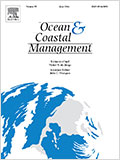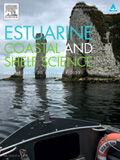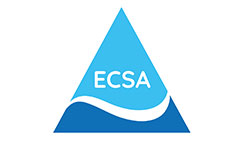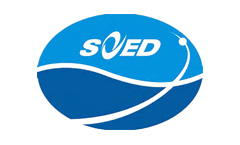Special Session
|
Submission Id |
2 |
Title |
Nitrogen biogeochemical cycling in estuarine and coastal ecosystems |
Convener |
Lijun Hou, East China Normal University, China |
Description |
Nitrogen (N) is entering Earth's land surface at more than twice its natural rate due mainly to the production and widespread application of N fertilizer and combustion of fossil fuels. Much of the anthropogenic N is delivered to estuarine and its adjacent coastal ecosystems, which results in substantial reactive N enrichment. This N pollution continues to threaten the ecology health of estuaries and coasts and cause serious environmental problems ranging from eutrophication to hypoxia and aquatic acidification. Therefore, it is important to improve the understanding of N transformation processes in estuarine and coastal environments, which may provide important scientific basis for the environmental management, ecological protection and restoration of these important ecosystems. This session provides a platform to discuss new research and significant advances related to the N cycling processes in the complex estuarine and coastal ecosystems. The themes of the session could include (but not be limited to):
|
Submission Id |
3 |
Title |
Social-oceanographical modeling to promote decision-making of coastal resilience in the Sustainable Development Goals(SDG) |
Convener |
Mingbao Chen, Macao University of science and technology/Sun Yat-sen University/Southern Ocean Science and Engineering Guangdong Laboratory(Zhuhai) |
Description |
The Sustainable Development Goals (SDGs) of the United Nations Agenda 2030, which thoroughly address inequalities and sustainable development in the social, economic and environmental dimensions in an integrated manner, represent an ambitious blueprint for achieving a sustainable future for all humankind. Achieving the SDG will require an integrated approach to the governance of ocean and coastal resources that involves all stakeholders, and considers how ocean and coastal resources link different sectors of society in order to improve the effectiveness of decision-making. To date, however, limited consideration of interactive feedback between the natural, technological and social dimensions of the human-ocean system, overly fragmented natural and social science research, and insufficient stakeholder engagement have led to ineffective governance of coastal resilience. Oceans and coastal, are widely recommended by academics to adopt socio-ecological systems approach to research to contribute to realizing of SDGs. Social oceanography, as an emerging discipline, provides a mechanistic explanation of the possible feedback mechanisms that may arise from the nonlinear interactions between different spatiotemporal scales of socio-oceanographical systems, and transforms the adaptive heterogeneity, power relations, trust, cultural beliefs, and cognitive biases of human society into endogenous elements of the system, Thus transforming the traditional decision-making process of separating humans from the ocean into a decision-making process that emphasizes mutual feedback. To this end, new methods and models need to be developed to reveal and measure the two-way feedback loop mechanisms and interactions between socio-ocean systems in the process of coastal resilience governance, and to promote the science of decision-making. This session welcomes top-down, bottom-up and comprehensive modelling studies of two-way feedback loop and interactions of socio-ocean systems involved in coastal resilience, transdisciplinary studies of integrating natural and social sciences in socio oceanography, as well as case studies of decision-making and governance processes that consider socio oceanography. |
Submission Id |
6 |
Title |
Ecological modelling of coastal ecosystems |
Convener |
Peisheng Huang, Centre for Water and Spatial Science, UWA School of Agriculture and Environment, The University of Western Australia, Perth, Australia |
Description |
Coastal systems, especially estuaries and lagoons, are generally under stress of climate perturbations and human interventions, and remain one of the most complex aquatic ecosystems for management. Ecological modelling plays a pivotal role in understanding and managing complex coastal ecosystems. Over the years, significant advancements have been made in this field, enhancing our ability to simulate and predict ecosystem dynamics. As coastal scientists, we recognize the growing need for advanced ecological models to understand, predict, and manage the complex interactions within these dynamic systems. This special session aims to bring together researchers, practitioners, and policymakers to explore cutting-edge ecological modeling approaches that contribute to the sustainable management and conservation of coastal ecosystems. |
Submission Id |
8 |
Title |
Response and resilience against natural hazards: science, policy and community engagement |
Convener |
Sourav Paul, Estuarine and Coastal Studies Foundation, India |
Description |
Natural hazards such as flush floods, tropical cyclones, hurricanes, typhoons and tsunamis are disrupting the estuary and coasts. Climate change has further aggravated their impacts. Ecological systems such as from molecules to ecosystems aren't able escape the wrath of such temporary to prolong disruptions. The humans which depend on ecology for their daily lives and livelihoods are therefore impacted and are trying to find solutions through science based management of those stochastic disturbances. Most countries across the world neither have definitive ecological monitoring and/or resilience protocols to put forward a global strategy (with some degree of local specific modifications) against natural hazards affecting estuaries and coasts. So, the questions are 1. development of ecological indicators of natural hazard management of estuaries and coasts 2. establishment of regional monitoring systems targeted to specific natural hazards 3. involvement of coastal communities, academia, and policy makers for adopting ecological solutions. The above theme shall encourage all the papers that are
|
Submission Id |
12 |
Title |
“Source-to-Sink” processes across the river-estuary-coast shelf continuum under changing climate and human activities |
Convener |
Aijun Wang, Third Institute of Oceanography, Ministry of Natural Resources, China |
Description |
Better understanding of the transport process and fate of terrigenous materials in the river-estuary-coastal shelf continuum, as well as the impact of climate change and human activities on these processes and their ecological and environmental effects, is of great significance for us to take appropriate measures for land-sea integration management, especially in the current context of "carbon neutrality", appropriate land-sea integration management strategies can improve the carbon sink potential of the river-estuary-coastal shelf continuum. For this special session, we are interested in the processes of materials transport, transformation and burial across the river-estuary-coastal shelf continuum, how climate change and human activities in the river basin interfere with these processes, and what impact these disturbances will have on the sedimentary environment and ecosystem evolution of the estuary and coastal shelf. In addition, we are also interested in how to take land-sea integration management measures to deal with the environmental changes of the river-estuary-coastal shelf continuum. We invite submissions that include sediment transport and sedimentation, geomorphological evolution, biogeochemical cycles, carbon ‘Source-to-sink’ transform processes across river-estuary-coastal shelf continuum, especially the transformation of above processes under the influence of climate change and human intervention. Submissions may be theoretical, case study specific, or involve comparative analysis. We are interested in studies are considering the river-estuary-coastal shelf continuum as a whole system, from the theoretical research of material transport process to ecosystem response, and then to management countermeasures. |
Submission Id |
13 |
Title |
Biogeochemistry and hydrology across the land-ocean continuum in the coastal transition zone |
Convener |
Bradley Weymer, Shanghai Jiao Tong University, China |
Description |
The transfers of carbon, nutrients and pollutants in water and sediments across the land-ocean continuum are important drivers of ecosystem dynamics and biogeochemical budgets. Strong gradients in turbidity, redox dynamics and carbonate chemistry combined with physical mixing processes make the coastal transition zone a hotspot for biogeochemical transformations affecting the fluxes, lability and bioaccessibility of chemical species. Understanding these transformations across diverse coastal zones is critical for assessing the viability of ocean management strategies including blue carbon storage, ocean alkalinity enhancement and the mitigation of anthropogenic pollution. Yet the coastal transition zone is challenging to study requiring research that bridges terrestrial/inshore and offshore surveys. We welcome submissions of studies that are multidisciplinary, combining different methodological approaches and/or contrasting different coastal regions in order to understand coastal transition zone dynamics. |
Submission Id |
16 |
Title |
Dynamics of organic carbon cycling at the land-ocean interface |
Convener |
Peng Yao, Ocean University of China, China |
Description |
Estuaries and coastal areas are important ecosystems that connect land and ocean. They play a crucial role in the transfer and transformation of organic carbon (OC) and other biogenic elements from both marine and terrestrial sources. The carbon cycle in these regions is an important component of the global carbon cycle budget. However, human activities and climate change can impact the carbon cycle in estuaries and coasts at different time scales (e.g., seasonal, decadal, century, and millennial) through various environmental changes, such as changes in terrigenous inputs, organic matter production, hydro- and sediment dynamics, due to increased population growth, damming, land use, temperature and precipitation changes, etc. Understanding how the differences of OC cycling in different regions of estuaries and coasts are integrated and/or isolated from the large-scale signals of ocean carbon cycle, requires better constraints on temporal and spatial variability of key drivers in these dynamic systems. This session aims to bring together researchers studying the sources, exchanges, and fates of OC in water, particles, and sediments and their complex interactions within estuarine and coastal regions and how anthropogenic activities and climate change have altered the carbon cycle. We encourage submissions that use diverse methodologies and consider different time scales to improve our understanding of the dynamics of OC cycling at the land-ocean interface. |
Submission Id |
22 |
Title |
Knowledge Co-Production in the Implementation of Closed Season in Africa |
Convener |
Victor Owusu, University of Education, Winneba, Ghana. |
Description |
This panel presents narratives on marine conservation initiatives in Africa , focusing on knowledge co-production towards the implementation of fishing bans and how conservation initiatives would help improve coastal livelihoods and marine sustainability.
|
Submission Id |
23 |
Title |
Estuarine & Coastal Sciences in Ice Cover Seas |
Convener |
Jiechen Zhao, Harbin Engineering University |
Description |
Ice covered Estuarine & Coastal seas, in Arctic, Antarctic and high latitude oceans, are a substantial part of the world's Estuarine & Coastal ocean. For example, the Arctic shelf area alone comprises approximately 25% of the total shelf area of the world oceans. The introduction of a seasonal ice cover adds another dimension to the already complex processes which define the circulation in shallow coastal seas. The ice cover serves to alter both the exchanges of heat fluxes and surfaces stresses between the atmosphere and ocean, In addition, the growth and decay of sea ice causes a seasonal adjustment to the stratification of the ocean by salinating the surface layer in winter when ice grows and freshening the surface layer in summer when ice melts. Adding the complexity of a sea ice cover to coastal processes makes it a more challenging region over which to understand the interactions of ocean Estuarine & Coastal processes. |
Submission Id |
30 |
Title |
Environmental change affecting COastal ecosystems of tropical China during the Anthropocene: Landward vs. OCeanic influence (ECOLOC) |
Convener |
Hongwei Zhao, Hainan University, Haikou, China |
Description |
The aim of the ECOLOC session is to provide a platform for discussion and exchange on the natural and anthropogenic factors controlling the physicochemical and biogeochemical environment of tropical coastal ecosystems in China and the response of these coastal habitats and their organisms (benthos, corals, seagrasses) to the input of land-derived anthropogenic substances along the coast. The session builds on the results of a Sino-German project on the tropical island of Hainan, but also invites contributions from other areas in China and around the globe which are facing similar issues. We are expecting contributions which address one or more of the below-listed research questions in the global coastal zone. |
Submission Id |
35 |
Title |
Challenges in the integration of ecological, socio-ecological and socio-economic aspects in estuarine, coastal and marine management |
Convener |
Michael Elliott, International Estuarine & Coastal Specialists (IECS) Ltd., and the University of Hull, UK |
Description |
The session will aim to cover a set of interlinked themes to give an holistic approach to integrated science and management of estuaries, coasts and marine areas. This will cover major recent and ongoing developments in the following themes: techniques, tools and approaches for ecological status assessments; the treatment of these areas as socio-ecological systems thereby requiring systems analysis for their study and management; the role of maritime spatial planning including different types of designations such as designated and de-facto Marine Protected Areas, Ecologically and Biologically Sensitive Areas, and Other Effective Conservation Measures; the role of Systematic Conservation Planning, and the approaches to the ecological, socio-ecological and socio-economic valuation of biodiversity in these areas. The session is coordinated by lead members of several large European projects and their international collaborators with the aim of demonstrating outputs from those projects and allowing their comparison with similar initiatives worldwide. In doing so, it will allow consideration of the achievements and constraints in marine and coastal natural and social sciences for management and the role of the various outputs in policy and other governance of complex areas. As such, the papers from worldwide contributors will increase collaboration, learning and the exchange of skills and information for mutual benefit. Furthermore, the session aims to encourage Early Career Researchers and Practitioners to develop their understanding across natural and social disciplines. |
Submission Id |
37 |
Title |
Blue Carbon ecosystem assessment, restoration and accounting |
Convener |
Xiaoxuan Gu, Xiamen University, China |
Description |
Blue carbon sequestration assumes a pivotal role in our collective response to global climate change. Under the sweeping goals to achieve carbon neutrality affirmed by both China and the world at large, the importance and functional capabilities of blue carbon magnify, transforming it into an indispensable linchpin for global climate administration. |
Submission Id |
38 |
Title |
Compound weather, climate and biogeochemical extreme events |
Convener |
Feng Zhou, State Key Laboratory of Satellite Ocean Environment Dynamics, Second Institute of Oceanography, Ministry of Natural Resources, China |
Description |
Compound extremes are a combination of multiple drivers and/or hazard factors that can cause more severe societal or environmental risks compared to individual hazards. Considering the increasing frequency and intensity of these events due to global warming, it is crucial for us to collectively examine the broader picture. This involves understanding not only the changes and underlying mechanisms of compound extremes, but also their far-reaching and multifaceted impacts on marine ecosystems. |
Submission Id |
41 |
Title |
Deepening knowledge on the resilience and responses of estuarine ecosystems under climate change |
Convener |
Hui Liu, Texas A&M University at Galveston, USA |
Description |
Estuaries experience vulnerabilitiesfrom natural and anthropogenic stressors across diverse scales. Particularly,hurricanes and typhoons, as climate-related cyclonic events, deliver acute disturbances with long-lasting effects on estuarine ecosystemsglobally.Existing studies indicate a rise in the intensity and frequency of the cyclonic activities under extreme climate scenarios, which provide an opportunity to explore ecosystem responses and resilience, contributing to strategic conservation and management.However, investigations often isolate ecosystem components without considering chronic impacts or ecological predictability in areas of recurrent disturbances, leaving a gap in comprehensive understanding of responses and resilience of estuaries regarding climate change. |
Submission Id |
42 |
Title |
Coastal wetlands: processes, interactions and evolutions |
Convener |
Zhan Hu, Sun Yat-sen University |
Description |
Coastal wetlands are dynamic and diverse ecosystems that serve as essential buffers between land and sea, providing valuable services such as coastal protection, carbon storage, habitat support for wildlife, and fisheries enhancement. Over the past decades, researchers have increasingly recognized the crucial role of coastal wetlands in various morphological processes and their interactions with surrounding environments. The processes, interactions, and evolutions of coastal wetlands have become a significant focus of research due to their vulnerability to environmental changes, including sea level rise, climate change, and human activities. Understanding the intricate connections and feedback mechanisms within these ecosystems is vital for effective conservation and sustainable management. In recent years, there has been a growing scientific interest in the processes, interactions and evolutions of coastal wetlands, both from a fundamental perspective (e.g., sedimentation and geomorphology) and a practical perspective (e.g., in the management of coastal wetlands). With the growing interesting on Coastal wetlands in various research contexts, we propose to create a session with the theme of "Coastal wetlands: processes, interactions, and evolutions" to gather a coherent set of high-quality research papers dedicated to this rising topic. |
Submission Id |
44 |
Title |
Estuarine and deltaic coastal resilience with nature-based solutions |
Convener |
Wei Chen, Helmholtz-Zentrum Hereon, Germany |
Description |
Estuaries and deltas are vulnerable geomorphic features of coastal zones, providing vital habitats and shelter for living species while hosting significant economic values. However, these regions are facing increasingly challenges from the cumulative impacts of intense human activities, such as land reclamation, shipping and constructions. Additionally, climate change, including sea-level rise will enhance these impacts across different temporal-spatial scales. Nature-based solutions (NBSs) are used as an adaptation measure to provide a low carbon footprint solution for disaster risk reduction, while contributing to building sustainability, resistance, and resilience in these threatened coastal systems. |
Submission Id |
45 |
Title |
Lateral exchanges of carbon and nutrient in coastal blue carbon ecosystems |
Convener |
Fang Cao, East China Normal University, China |
Description |
Coastal blue carbon ecosystems (mangroves, saltmarshes, seagrass) have been shown to be important in cycling carbon and nutrients along the estuarine continuum. By laterally exporting materials rich originating from these systems via tidal and porewater exchanges, blue carbon ecosystems have been shown to strongly influence the coastal biogeochemistry across the globe. Yet, we currently lack an accurate quantification of the flux and fate of the materials associated with the lateral exchanges, partly due to the complicated biogeochemical cycles within the blue carbon system and across the ecosystem-estuary interface. This is mainly due to the complexities involved in differing methodologies related to field monitoring. To better understand the function of coastal blue carbon ecosystems, it is imperative to better constrain the flux and understand the fate of the laterally exported nutrients and carbon. The purpose of this session will be to include scientific progress, novel methodologies, and datasets to better understand lateral carbon and nutrient export from various coastal ecosystems, including blue carbon habitats. |
Submission Id |
46 |
Title |
Mainstreaming Nature-Based Solutions for transformative climate adaptation in marine coastal areas |
Convener |
Elisa Furlan, Centro Euro-Mediterraneosui Cambiamenti Climatici and Università Ca’ Foscari Venezia, CMCC@Ca'Foscari – Edificio Porta dell'Innovazione, 2nd floor – Via della Libertà, 12 – 30175 Venice, Italy |
Description |
Coastal marine and transitional ecosystems are among the most important regarding ecosystem service provisioning. However, these ecosystems are under increasing anthropogenic (e.g., eutrophication, dredging and dumping, sand mining, pollution, boating, coastal development) and climatic (e.g., sea level rise, increasing temperature, storm surges, hurricanes) pressures. Climate change is projected to affect these ecosystems increasingly adversely, while new risks are expected to emerge, resulting in a decrease in ecosystem services and resilience. Addressing current and future coastal risk requires urgent actions to mitigate the impacts from multiple hazards, and boost ecosystems’ resilience using flexible and adaptable solutions before they reach a tipping point where the resilience deficit makes it hard to restore the system in place. |





